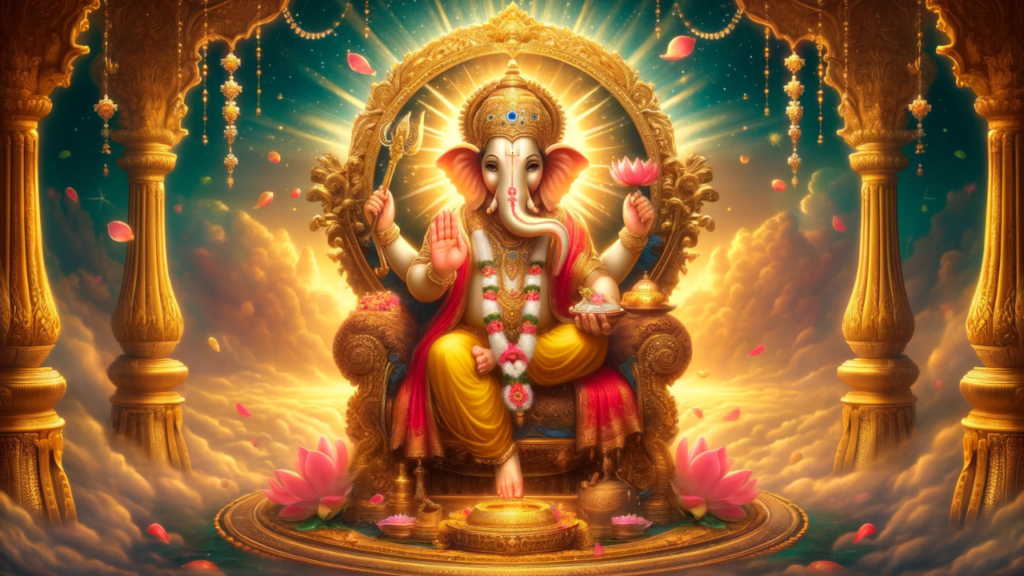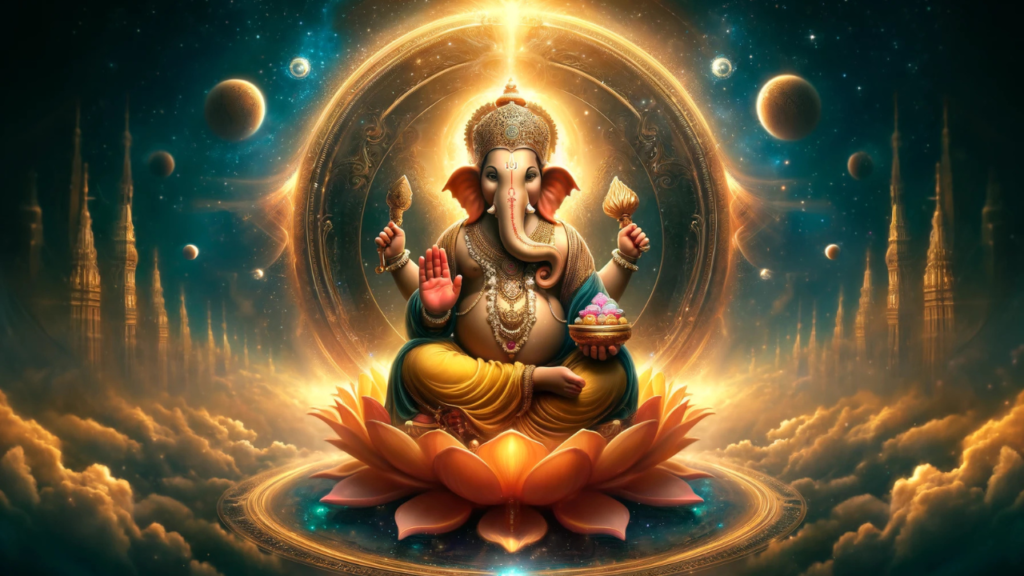Ganesh, also known as Ganapati or Vinayaka, is one of Hinduism’s most revered and instantly recognizable deities. With his elephant head, potbelly, and benevolent demeanor, he transcends religious boundaries to become a global icon of wisdom, prosperity, and new beginnings. This article delves into the rich symbolism, captivating legends, and enduring cultural legacy of Ganesh, offering insights into why millions revere him as the “Vighnaharta” (Remover of Obstacles).

The Symbolism of Ganesh: A Deity of Profound Meaning
Every aspect of Ganesh’s form carries deep philosophical significance. His elephant head symbolizes intelligence, foresight, and the ability to navigate life’s complexities. The large ears remind devotees to listen more and speak less, while the small eyes emphasize the importance of inner vision over external distractions.
Ganesh’s rotund belly represents the universe’s abundance and the idea of digesting life’s joys and sorrows with equanimity. He often holds symbolic objects: a modak (sweet dumpling) in one hand signifies the rewards of spiritual pursuit, an axe in another severs attachments, and a noose helps capture difficulties. His mouse companion, often overlooked, embodies humility and the need to control restless desires.
Legends of Ganesh: Myths That Define a Deity
Vighneshwara origin stories are as fascinating as his form. One popular legend describes how the goddess Parvati created him from turmeric paste to guard her privacy. When her consort Shiva unknowingly beheaded the boy, he replaced the head with that of an elephant, restoring life and marking Vighneshwara transformation into a divine being.
Another tale highlights Vighneshwara wisdom. When asked to circle the world, his brother Kartikeya raced off on a peacock, while Vighneshwara simply circled his parents, Shiva and Parvati, declaring, “My parents are my universe.” This story underscores the value of familial devotion and spiritual insight over physical prowess.
Worship and Rituals: Invoking Ganesh’s Blessings
Ganesh is worshipped at the start of any endeavor, from weddings to business ventures, to ensure success. The chant “Om Gam Ganapataye Namah” is believed to clear mental and physical obstacles. His favorite offering, modak, is a staple in rituals.
The festival of Ganesh Chaturthi, celebrated with grandeur in India, marks his birth. Elaborate clay idols are installed in homes and public spaces, followed by ten days of prayer, music, and community feasts. The immersion of idols in water symbolizes the cycle of creation and dissolution, reminding devotees of life’s impermanence.

Cultural Impact: Beyond Religious Boundaries
Ganesh’s influence extends far beyond Hindu temples. In Thailand, he is revered as Phra Phikanet, a patron of arts and business. Indonesian Hindus incorporate him into rituals, while Japanese Buddhists worship him as Kangiten, a deity of harmony.
In contemporary culture, Vighneshwara appears in yoga studios, mindfulness apps, and even corporate logos, embodying resilience and strategic thinking. Artists worldwide reimagine his form in murals, sculptures, and digital art, blending tradition with modernity.
Ganesh in Modern Times: A Beacon of Hope
Today, Vighneshwara teachings resonate deeply in a fast-paced, obstacle-filled world. His message of introspection, adaptability, and perseverance offers solace to those facing personal or global challenges. Environmentalists also reinterpret his symbolism, advocating for the protection of elephants and ecological balance.
Conclusion: The Eternal Relevance of Ganesh
Ganesh’s enduring appeal lies in his dual role as a guardian and teacher. He is both approachable and profound, a deity who bridges the human and divine. Whether through ancient rituals or modern metaphors, Ganesh continues to inspire millions to embrace wisdom, overcome adversity, and celebrate life’s journey with grace.
గణపతి (Ganapati):
- “గణ” అంటే సమూహం (గణాలు – శివుని అనుచరులు), “పతి” అంటే అధిపతి.
- అందుకే గణపతి అంటే గణాధిపతి (గణాల అధినాయకుడు) అని అర్థం.
వినాయకుడు (Vinayaka):
- “వి” అంటే ప్రత్యేకమైన, “నాయక” అంటే నాయకుడు.
- వినాయకుడు అంటే ఏ అధికారి లేకుండా స్వయంగా నాయకత్వం వహించగల దేవుడు.
ఇవే కాకుండా, గణపతికి వక్రతుండ, విఘ్నేశ్వర, లంబోదర, గజానన, వినాయకేశ్వరుడు లాంటి అనేక పేర్లు ఉన్నాయి. 🕉️🙏
